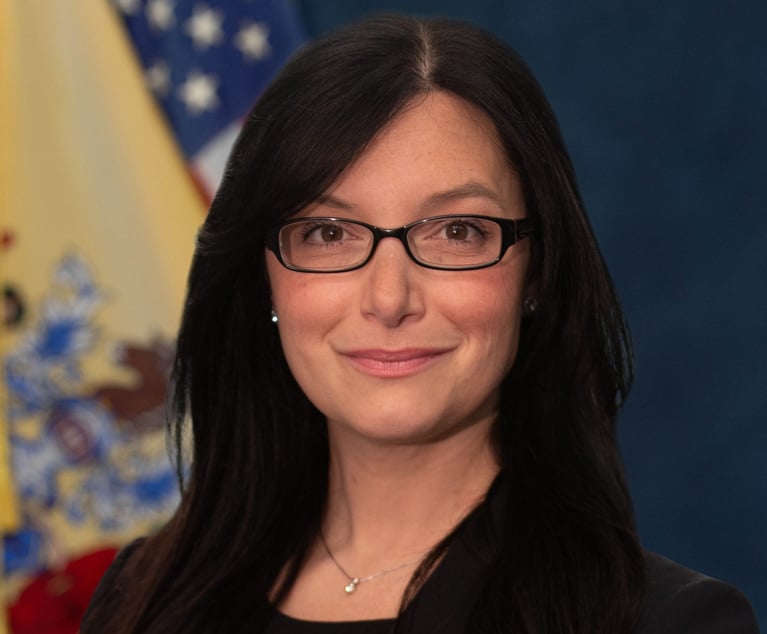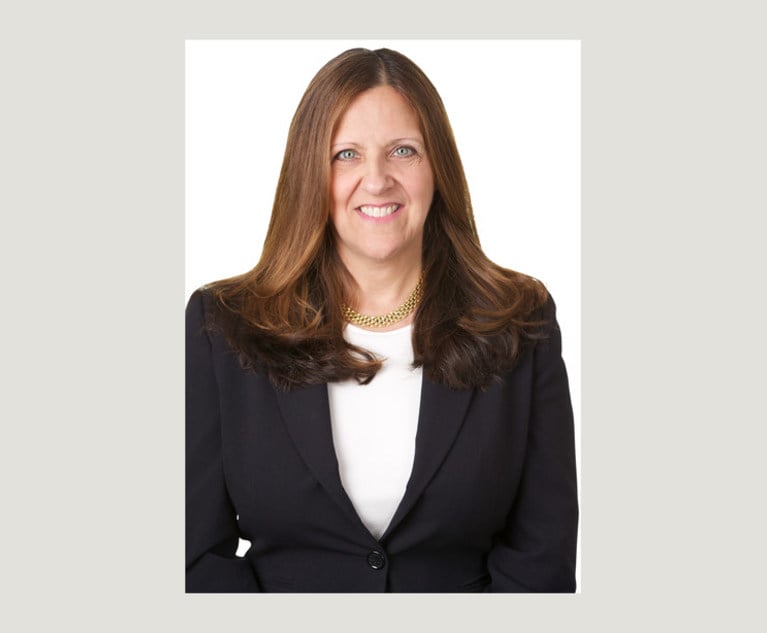 Kristine Feher of Greenberg Traurig
Kristine Feher of Greenberg TraurigMentors Must Share Challenges Along With Successes, Greenberg Traurig's Feher Says
"There have been many times I doubted whether I could keep going; but if the fact that I did somehow inspires someone else, that inspires me."
June 10, 2019 at 06:00 PM
5 minute read
Kristine Feher chairs Greenberg Traurig's Women's Initiative in New Jersey and co-chairs its New Jersey Associate Development Committee. Feher says it's more the “little moments” that make a good mentor (see below), but she is also known for empowering mentees, including by creating panels made up of younger lawyers tasked with planning events or training sessions, and for pushing fellow partners to take part in mentorship efforts. “Kris has been acting as a mentor since she started practicing law,” and she “is invaluable to our office,” colleagues said, noting testimonials from Feher's mentees who credit Feher with advocating for and supporting them.
Is the role of mentor one that you set out to take, or one you happened into?
One I happened into, but love! At the beginning of my career, I was asked to serve as a buddy, and later, as a partner mentor to summer associates. As I continued to progress in my career, I became more active in teaching, training, and participating in women's initiatives. Although many women and men have worked to make the legal profession more supportive of the inclusion and advancement of women, many of the challenges that we faced 25 years ago remain. I am passionate about not only helping more junior attorneys navigate those challenges, but also leaving a legacy. When it comes time for me to leave the profession, I hope women are facing fewer challenges than we were when I started my career.
Why are mentors so important in the legal profession?
This is a very demanding profession, and it is not always easy to maintain your sense of self or confidence, let alone any semblance of work-life balance. Mentors don't just serve as examples of successes—the best ones share their challenges, fears, and failures as well, and support and encourage mentees through their challenges and self-doubts. A pregnant associate recently told me, “the only reason I know I can do it [juggle a family with a career in litigation] is because you did it.” That comment reinforced my commitment to mentoring. I've been married for 25 years, raised two kids, and battled cancer twice while maintaining a career as a litigator. There have been many times I doubted whether I could keep going; but if the fact that I did somehow inspires someone else, that inspires me.
Good mentors often have learned from good examples. Who are some people who have mentored you?
My father-in-law, Laddie Feher, practiced for 50 years, and was a friend to all. He taught me that you don't have to sacrifice your decency to be an effective advocate. Wendy Johnson Lario, a fellow shareholder in the Labor & Employment Practice at Greenberg Traurig, inspires me every day with her extraordinary work ethic, dignity, and fierce loyalty to our team and clients. Mike Nicodema, an outstanding trial attorney at Greenberg Traurig, has shared not only strategies and knowledge regarding trials, but his passion for training the next generation. My first boss, Greg Parliman, taught me how to think and to trust my instincts. And Jonathan Hill, a former colleague, taught me to write better when I thought I already knew how, and models compassion, integrity, and self-deprecating humor in everything he does. (Don't judge him by my writing, though; his is far superior.)
Law is, for many, more than a full-time job. How does one create time for mentorship?
Mentoring doesn't always happen at events, lunches out, and training programs; it is in the little moments in between that, I think, I've been the best mentor: taking the time to explain why I did something a certain way; giving associates opportunities to take on more advanced work and more lead roles in groups and on cases; talking with someone who's feeling overwhelmed; or sometimes just confessing the mistakes I've made to encourage someone who's had a rough day. Many of these moments do take time out of your day, so I'm grateful to be at a firm that values and encourages mentoring.
How are the business and profession of law changing, and are New Jersey lawyers well-positioned for the future?
Technology has been a huge driver of change in the profession: firms and attorneys are increasingly using social media to market and share thought leadership; technology to support discovery practices and trial presentation; artificial intelligence to support briefing; and virtual offices to cut costs and provide flexibility and work-life balance. The New Jersey market, in particular, poses certain challenges in overhead costs, market saturation, and recruitment and retention of diverse talent. I am hopeful as I see savvy New Jersey practitioners working collaboratively, embracing innovative ideas, and utilizing new technology to address all of those challenges.
This content has been archived. It is available through our partners, LexisNexis® and Bloomberg Law.
To view this content, please continue to their sites.
Not a Lexis Subscriber?
Subscribe Now
Not a Bloomberg Law Subscriber?
Subscribe Now
NOT FOR REPRINT
© 2024 ALM Global, LLC, All Rights Reserved. Request academic re-use from www.copyright.com. All other uses, submit a request to [email protected]. For more information visit Asset & Logo Licensing.
You Might Like
View All
For Lawyers, the 'Work' of Making an Impact Does Not Have to Happen in a Courtroom. Laura E. Sedlak Says

Doing the Right Thing in the Pursuit of Justice Requires Guts, Says Lyndsay Ruotolo

One Can be Most Impactful When Their Pursuits Are Driven by Their Concerns and Passions, Says Sherilyn Pastor

As a Lawyer, You Have a Powerful Way to Make an Impact, Says Mary Frances Palisano
Trending Stories
Who Got The Work
Michael G. Bongiorno, Andrew Scott Dulberg and Elizabeth E. Driscoll from Wilmer Cutler Pickering Hale and Dorr have stepped in to represent Symbotic Inc., an A.I.-enabled technology platform that focuses on increasing supply chain efficiency, and other defendants in a pending shareholder derivative lawsuit. The case, filed Oct. 2 in Massachusetts District Court by the Brown Law Firm on behalf of Stephen Austen, accuses certain officers and directors of misleading investors in regard to Symbotic's potential for margin growth by failing to disclose that the company was not equipped to timely deploy its systems or manage expenses through project delays. The case, assigned to U.S. District Judge Nathaniel M. Gorton, is 1:24-cv-12522, Austen v. Cohen et al.
Who Got The Work
Edmund Polubinski and Marie Killmond of Davis Polk & Wardwell have entered appearances for data platform software development company MongoDB and other defendants in a pending shareholder derivative lawsuit. The action, filed Oct. 7 in New York Southern District Court by the Brown Law Firm, accuses the company's directors and/or officers of falsely expressing confidence in the company’s restructuring of its sales incentive plan and downplaying the severity of decreases in its upfront commitments. The case is 1:24-cv-07594, Roy v. Ittycheria et al.
Who Got The Work
Amy O. Bruchs and Kurt F. Ellison of Michael Best & Friedrich have entered appearances for Epic Systems Corp. in a pending employment discrimination lawsuit. The suit was filed Sept. 7 in Wisconsin Western District Court by Levine Eisberner LLC and Siri & Glimstad on behalf of a project manager who claims that he was wrongfully terminated after applying for a religious exemption to the defendant's COVID-19 vaccine mandate. The case, assigned to U.S. Magistrate Judge Anita Marie Boor, is 3:24-cv-00630, Secker, Nathan v. Epic Systems Corporation.
Who Got The Work
David X. Sullivan, Thomas J. Finn and Gregory A. Hall from McCarter & English have entered appearances for Sunrun Installation Services in a pending civil rights lawsuit. The complaint was filed Sept. 4 in Connecticut District Court by attorney Robert M. Berke on behalf of former employee George Edward Steins, who was arrested and charged with employing an unregistered home improvement salesperson. The complaint alleges that had Sunrun informed the Connecticut Department of Consumer Protection that the plaintiff's employment had ended in 2017 and that he no longer held Sunrun's home improvement contractor license, he would not have been hit with charges, which were dismissed in May 2024. The case, assigned to U.S. District Judge Jeffrey A. Meyer, is 3:24-cv-01423, Steins v. Sunrun, Inc. et al.
Who Got The Work
Greenberg Traurig shareholder Joshua L. Raskin has entered an appearance for boohoo.com UK Ltd. in a pending patent infringement lawsuit. The suit, filed Sept. 3 in Texas Eastern District Court by Rozier Hardt McDonough on behalf of Alto Dynamics, asserts five patents related to an online shopping platform. The case, assigned to U.S. District Judge Rodney Gilstrap, is 2:24-cv-00719, Alto Dynamics, LLC v. boohoo.com UK Limited.
Featured Firms
Law Offices of Gary Martin Hays & Associates, P.C.
(470) 294-1674
Law Offices of Mark E. Salomone
(857) 444-6468
Smith & Hassler
(713) 739-1250






